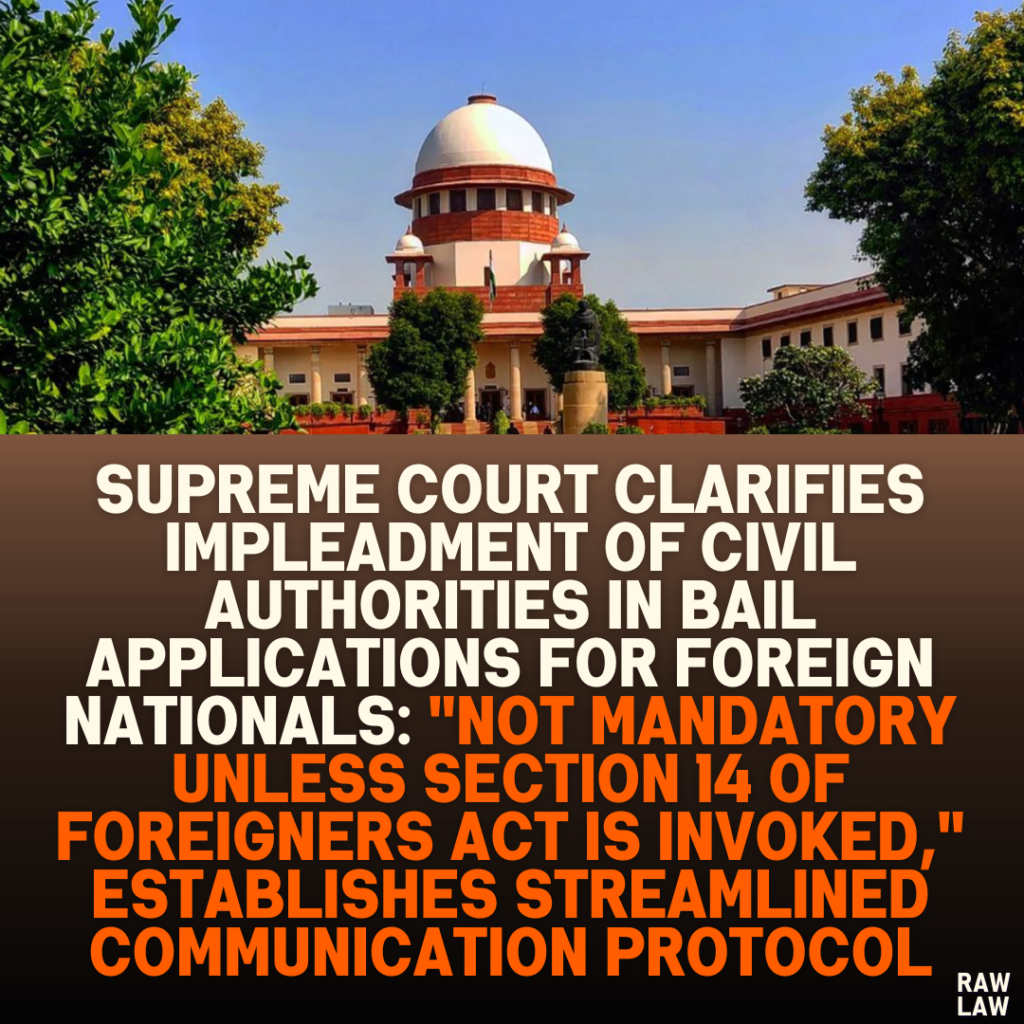Court’s Decision:
The Supreme Court addressed whether it is necessary to implead the Civil Authority or the Registration Officer under the Foreigners Act, 1946, in bail applications filed by foreign nationals. The Court held:
- No Mandatory Impleadment: The Civil Authorities or Registration Officers are not required to be made parties in bail applications unless the offence involves Section 14 of the Foreigners Act.
- Streamlined Communication: While granting bail, the Court must direct the prosecuting agency to notify the Registration Officer, who will further inform the Civil Authorities to ensure compliance with the Foreigners Order, 1948.
The Court’s reasoning emphasized avoiding unnecessary delays in bail decisions while ensuring that the legal framework regulating foreigners’ movements is respected.
Facts:
- The matter arose from a bail application filed by a foreign national under the Foreigners Act, 1946.
- The issue was whether the court, while deciding bail applications for foreign nationals, is required to implead the Registration Officer or the Civil Authority, as appointed under the Foreigners Order, 1948.
- The appellant contended that impleadment was unnecessary and would cause procedural delays.
Issues:
- Whether impleadment of the Civil Authority or Registration Officer is mandatory for bail applications by foreign nationals.
- What mechanisms should be in place to ensure that bail orders are effectively communicated to relevant authorities under the Foreigners Act.
Petitioner’s Arguments:
- The petitioner argued that requiring impleadment of the Civil Authorities or Registration Officer would lead to delays in deciding bail applications.
- The petitioner pointed out that the Foreigners Act does not explicitly mandate such impleadment for routine bail matters.
Respondent’s Arguments:
- The Additional Solicitor General (ASG) argued that while impleadment might not always be necessary, the authorities under the Foreigners Act should be notified to ensure the implementation of restrictions or monitoring requirements.
- The ASG emphasized the need for oversight mechanisms to safeguard national interests.
Analysis of the Law:
- Foreigners Act, 1946:
- Section 3 empowers the Central Government to regulate the entry, departure, and movements of foreigners in India.
- Section 14 deals with offences such as non-compliance with the provisions of the Act, which may require active involvement of Civil Authorities.
- Foreigners Order, 1948:
- Clause 5 mandates that foreigners must obtain permission from Civil Authorities to leave India.
- Clause 11 provides for restrictions on the movements of foreigners while in India.
- Judicial Discretion in Bail:
- Bail decisions lie within the jurisdiction of criminal courts, independent of the administrative powers of Civil Authorities.
Precedent Analysis:
- The Court highlighted that there is no general requirement for Civil Authorities to oppose bail unless the foreign national is charged under Section 14 of the Foreigners Act, where their role may be relevant.
- The ruling distinguishes between administrative powers of Civil Authorities and judicial discretion in granting bail.
Court’s Reasoning:
- No Locus for Civil Authorities: The Court clarified that Civil Authorities or Registration Officers do not have the locus to oppose bail applications unless the charges involve Section 14 of the Act.
- Separate Powers: The power to regulate foreigners’ movements under the Foreigners Act is distinct from the criminal court’s power to grant bail.
- Avoiding Delays: Mandatory impleadment of authorities would unnecessarily delay bail proceedings.
- Communication Protocol: The Court established that prosecuting agencies must notify Registration Officers about bail orders to ensure compliance with administrative requirements.
Conclusion:
The Supreme Court concluded:
- It is not necessary to implead the Civil Authority or Registration Officer in bail applications filed by foreign nationals unless Section 14 offences are alleged.
- Courts must direct prosecuting agencies to notify the Registration Officer of the bail order. This notification ensures that the authorities under the Foreigners Act can take necessary steps, such as imposing restrictions or regulating the foreign national’s movement.
Implications:
- Procedural Efficiency: The judgment eliminates unnecessary delays in bail applications for foreign nationals by removing the requirement for impleadment of Civil Authorities.
- Balance of Powers: The ruling ensures that judicial discretion in bail matters is not hindered while maintaining regulatory oversight by the authorities under the Foreigners Act.
- Clear Guidelines: The decision provides clarity on the roles of courts and administrative authorities in cases involving foreign nationals.




Pingback: Delhi High Court: Suspension of Look Out Circular (LOC) for Conditional International Travel; Prolonged Restrictions Violate Article 21 in Financial Fraud Allegations - Raw Law